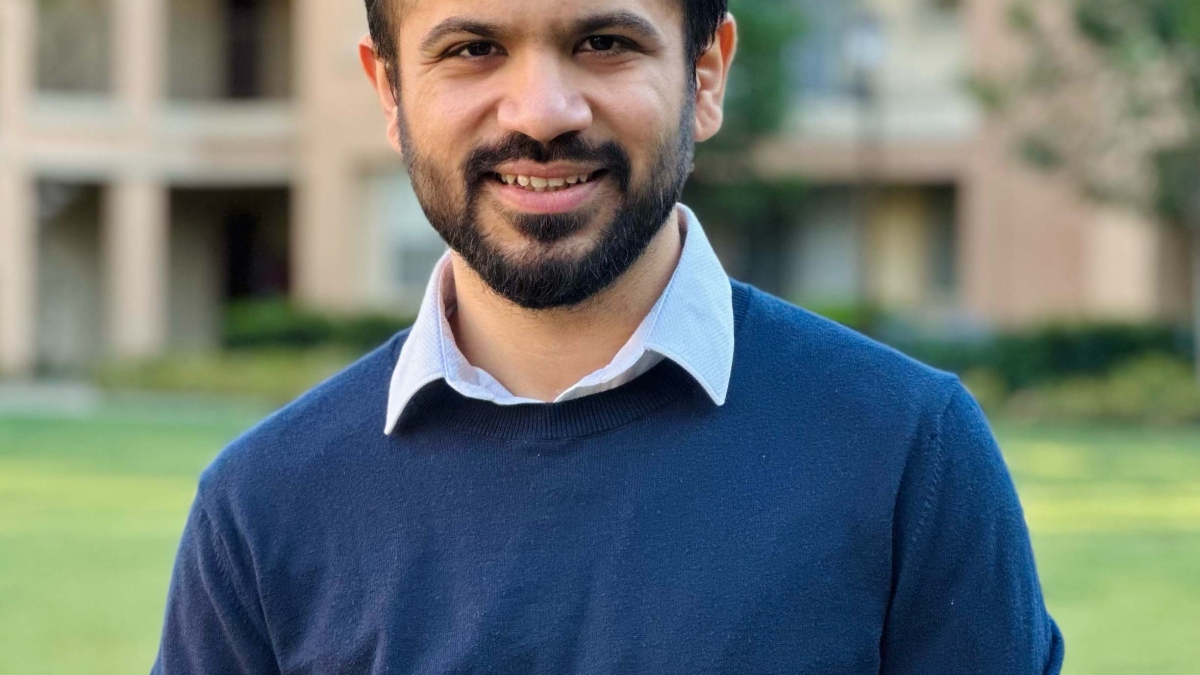Palais Award winner succeeds academically and gains Qualcomm job

Ashwin Chandwani won the Palais Outstanding Doctoral Student Award, which is given to an electrical engineering doctoral student who demonstrates exceptional academic and research achievement. Photo courtesy of Ashwin Chandwani
Editor’s note: This story is part of a series of profiles of notable spring 2023 graduates. Ashwin Chandwani in fact graduated in December 2022, but Palais Outstanding Doctoral Student Award winners are honored in the spring, no matter when they graduated during the school year.
Ashwin Chandwani came to the Ira A. Fulton Schools of Engineering at Arizona State University for the diverse cultural environment represented at ASU and its research and academic excellence.
After graduating from ASU’s School of Electrical, Computer and Energy Engineering, part of the Fulton Schools, with his master’s degree in electrical engineering, Chandwani decided to continue his education with a doctoral degree and pursue research in advanced power electronics converters.
Chandwani focused his research on the design, modeling and control of converters for electric vehicle chargers, renewable energy resources, data centers and more. He chose the field because of a fascination with the ability of semiconductor materials to convert and regulate large amounts of electrical power.
“I enjoy designing a converter from scratch,” Chandwani says. “Witnessing my efforts culminate in the successful operation of the converter, after hours of work and perseverance, is an incredibly rewarding experience.”
In the course of his degree program, he transcended disciplinary boundaries to incorporate fields such as machine learning, cybersecurity and power resiliency into his work with power electronics converters.
Chandwani’s outstanding academic work resulted in his graduation in December 2022 with a 4.0 GPA, 12 journal publications, 18 conference publications and two patents that have been issued or are pending. These achievements won him the Palais Outstanding Doctoral Student Award, an annual award given to an electrical engineering doctoral student who exemplifies academic and research achievement, which is given in the spring.
“Upon learning that I had been selected for the award, I was overwhelmed with joy and enthusiasm,” Chandwani says. “It is a testament to the countless hours of research, hard work and perseverance that I have put in over the years. It has provided me with a renewed sense of motivation to continue to strive for excellence in all of my future endeavors.”
The award was established in 2003 by electrical engineering Graduate Program Chair and Professor Emeritus Joseph Palais and his wife, Sandra. Students with a GPA of at least 3.75 and a journal publication are eligible to be nominated by faculty. The winner receives a commemorative plaque at the Fulton Schools PhD hooding ceremony and a $1,000 cash prize.
Chandwani names his doctoral mentor, engineering Assistant Professor Ayan Mallik of The Polytechnic School, and electrical engineering Professor Raja Ayyanar as key in helping him achieve electrical engineering excellence.
“Dr. Mallik’s unwavering support and mentorship encouraged me to strive for more challenging yet rewarding goals,” Chandwani says. “He not only provided regular technical discussions and meetings, but he also fostered a sense of innovation by sharing valuable ideas.”
For Mallik, Chandwani winning the Palais Outstanding Doctoral Student Award is particularly special because Chandwani was his first doctoral student. Mallik worked with Chandwani not only on preparing research papers and providing research guidance, but also on teaching him power hardware testing and debugging skills in a lab setting for three to four hours every day for a few months.
“I feel ecstatically happy about Ashwin winning this prestigious award out of a competitive pool of candidates,” Mallik says. “I had won the best doctoral dissertation research award in the engineering school at the University of Maryland, where I received my doctoral degree. Now that I, as a mentor, have been able to help my first doctoral graduate win a similar award, this makes me a proud advisor.”
Since he graduated, Chandwani has gone on to work as a senior power management systems engineer at technology company Qualcomm in San Diego. He hopes to improve the efficiency and sustainability of power electronics converters, mentor future engineers and ultimately change the world for the better.
“I aspire to collaborate with industry leaders and policymakers to address challenges in the field and contribute to the development of practical solutions that can benefit society as a whole,” Chandwani says.
Read about other exceptional graduates of the Fulton Schools’ spring 2023 class here.
Favorites
Hobby: Playing soccer and hiking.
Movies: "Good Will Hunting" and "Shawshank Redemption."
TV show: "The Office."
Performers: The Weeknd and Iron Maiden.
Sports team: FC Barcelona soccer team.
More Science and technology

Cracking the code of online computer science clubs
Experts believe that involvement in college clubs and organizations increases student retention and helps learners build valuable…
Consortium for Science, Policy & Outcomes celebrates 25 years
For Arizona State University's Consortium for Science, Policy & Outcomes (CSPO), recognizing the past is just as important as…

Hacking satellites to fix our oceans and shoot for the stars
By Preesha KumarFrom memory foam mattresses to the camera and GPS navigation on our phones, technology that was developed for…